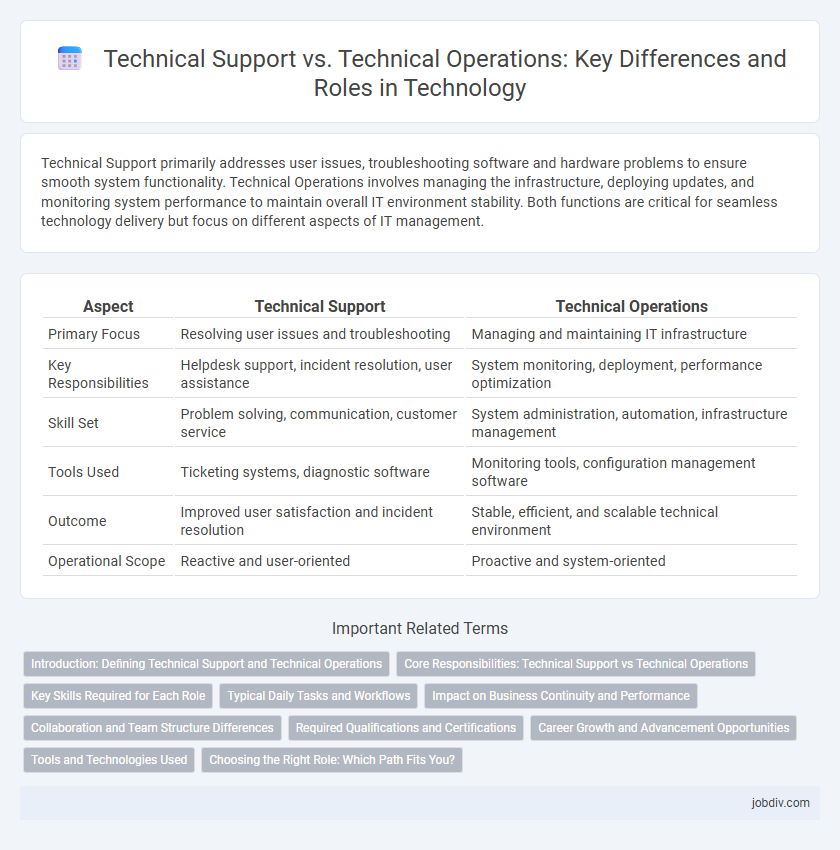Technical Support primarily addresses user issues, troubleshooting software and hardware problems to ensure smooth system functionality. Technical Operations involves managing the infrastructure, deploying updates, and monitoring system performance to maintain overall IT environment stability. Both functions are critical for seamless technology delivery but focus on different aspects of IT management.
Table of Comparison
| Aspect | Technical Support | Technical Operations |
|---|---|---|
| Primary Focus | Resolving user issues and troubleshooting | Managing and maintaining IT infrastructure |
| Key Responsibilities | Helpdesk support, incident resolution, user assistance | System monitoring, deployment, performance optimization |
| Skill Set | Problem solving, communication, customer service | System administration, automation, infrastructure management |
| Tools Used | Ticketing systems, diagnostic software | Monitoring tools, configuration management software |
| Outcome | Improved user satisfaction and incident resolution | Stable, efficient, and scalable technical environment |
| Operational Scope | Reactive and user-oriented | Proactive and system-oriented |
Introduction: Defining Technical Support and Technical Operations
Technical Support focuses on assisting users by troubleshooting hardware, software, and network issues to ensure optimal system functionality. Technical Operations involves managing, monitoring, and maintaining IT infrastructure and services to optimize performance, availability, and security. Both functions are critical for seamless technology deployment, with Support addressing immediate user problems and Operations ensuring long-term system stability.
Core Responsibilities: Technical Support vs Technical Operations
Technical Support primarily focuses on diagnosing, troubleshooting, and resolving end-user technical issues to ensure seamless software and hardware functionality. Technical Operations centers on managing IT infrastructure, system administration, and deployment processes to maintain system stability and performance. Both roles collaborate to optimize organizational technology environments, with support addressing immediate user problems and operations ensuring long-term system reliability.
Key Skills Required for Each Role
Technical Support requires strong problem-solving skills, excellent communication, and expertise in troubleshooting hardware and software issues to assist end-users efficiently. Technical Operations demands proficiency in system administration, network management, and automation tools to ensure seamless IT infrastructure performance and reliability. Both roles benefit from analytical thinking and the ability to work under pressure, though Technical Operations often involves a deeper understanding of backend systems and continuous monitoring.
Typical Daily Tasks and Workflows
Technical Support primarily involves troubleshooting user issues, responding to tickets, and providing real-time assistance via phone, chat, or email to ensure uninterrupted end-user experience. Technical Operations focuses on system monitoring, infrastructure maintenance, deployment automation, and performance optimization to sustain overall IT environment stability and efficiency. Both functions collaborate closely, with Technical Support feeding issue trends to Technical Operations for proactive system improvements.
Impact on Business Continuity and Performance
Technical Support ensures immediate resolution of IT issues, minimizing downtime and maintaining system availability critical for business continuity. Technical Operations focuses on the proactive management and optimization of IT infrastructure, enhancing overall performance and scalability. Both functions are essential for sustaining seamless business processes and driving operational efficiency.
Collaboration and Team Structure Differences
Technical Support teams focus on resolving user issues and providing frontline troubleshooting, requiring a structure centered on rapid response and customer interaction. Technical Operations teams manage infrastructure stability and system performance, emphasizing proactive maintenance and cross-departmental coordination. Collaboration between these teams involves clear communication channels and defined roles to ensure seamless incident management and continuous service improvement.
Required Qualifications and Certifications
Technical Support roles typically require strong problem-solving skills, proficiency in troubleshooting software and hardware issues, and certifications such as CompTIA A+, Microsoft Certified: Azure Fundamentals, or ITIL Foundation to ensure effective incident management and customer service. Technical Operations positions demand a deeper understanding of system administration, network infrastructure, and automation, often necessitating certifications like Cisco Certified Network Associate (CCNA), Red Hat Certified Engineer (RHCE), or AWS Certified Solutions Architect to manage and optimize IT environments efficiently. Both fields value foundational IT knowledge but diverge in specialization, with support focusing on user assistance and operations emphasizing infrastructure stability and performance.
Career Growth and Advancement Opportunities
Technical Support roles emphasize direct problem-solving skills and client interaction, offering rapid skill acquisition in troubleshooting and customer communication. Technical Operations positions provide broader exposure to system management, process optimization, and strategic project deployment, facilitating advancement into leadership or specialized technical roles. Career growth in Technical Operations often surpasses Technical Support due to increased responsibilities and alignment with organizational goals.
Tools and Technologies Used
Technical Support primarily utilizes remote desktop software, ticketing systems like Zendesk, and diagnostic tools to troubleshoot and resolve end-user issues swiftly. Technical Operations leverages infrastructure automation tools such as Ansible, Kubernetes, and monitoring platforms like Prometheus to ensure system reliability and scalability. Both domains rely on complementary technologies to maintain seamless IT service delivery and operational efficiency.
Choosing the Right Role: Which Path Fits You?
Technical Support focuses on resolving customer issues and troubleshooting software or hardware problems, demanding strong communication skills and problem-solving expertise. Technical Operations involves managing IT infrastructure, system performance, and deployment processes, requiring deep technical knowledge and operational efficiency. Choosing the right role depends on whether you prefer direct user interaction and immediate issue resolution or behind-the-scenes system management and optimization.
Technical Support vs Technical Operations Infographic

 jobdiv.com
jobdiv.com